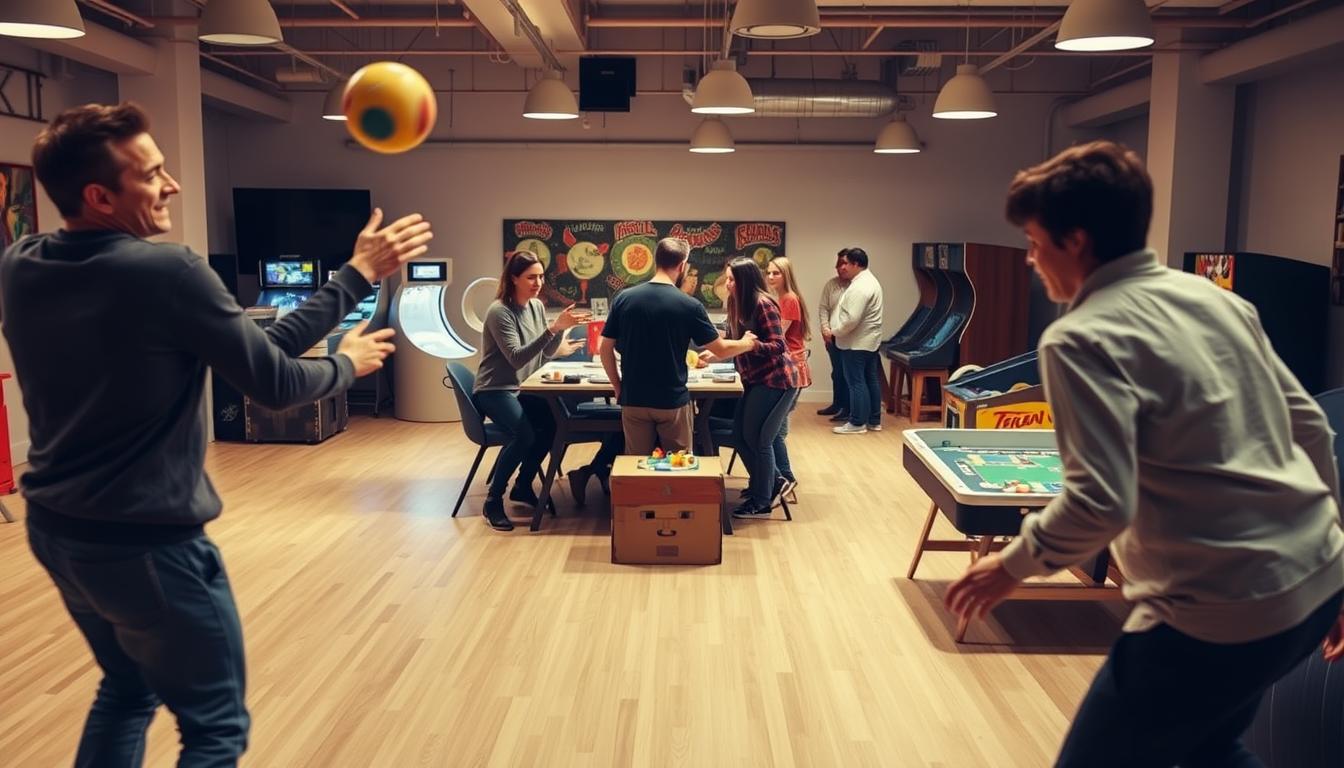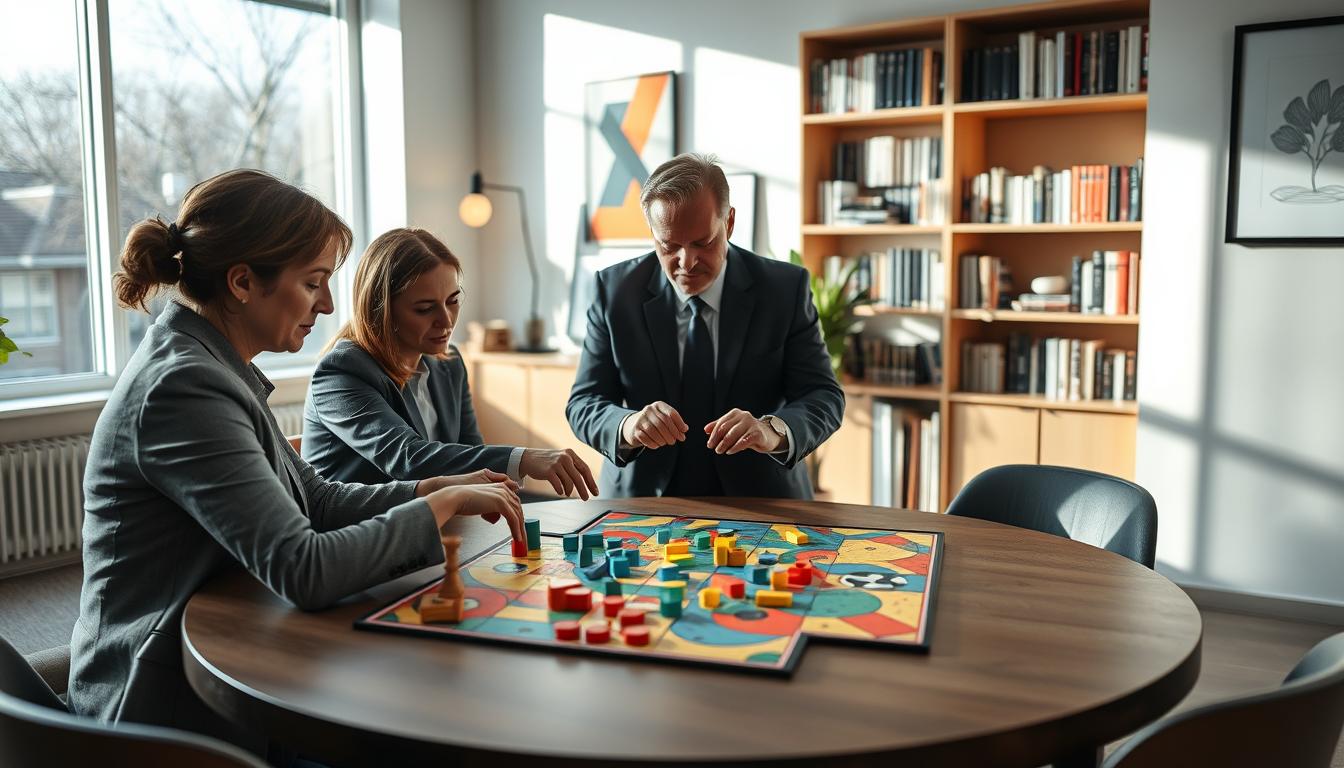Games that strengthen control between reasoning and physical actions in adults
Did you know that playing certain games can boost your brain and body skills? Mind and body coordination games can sharpen your thinking and improve your physical abilities. These games are more than fun; they help you think better and train your brain.
By exploring these games, you can enhance your mental sharpness. They also help improve your overall health and well-being.
Introduction to Mind and Body Coordination Games
Mind and body coordination games are a special way to boost both mental and physical health. They challenge players, helping to strengthen the mind-body connection. Playing these games can improve your focus and memory.
Adding these games to your daily life makes staying mentally sharp fun. They’re not just for fun; they also help keep your mind healthy.
More people are seeing how valuable these games are for everyday life. They help improve both mental quickness and physical coordination. Playing them can be a fun way to support your brain health.
Understanding the Connection Between Cognition and Physical Action
The link between thinking and moving is really interesting in brain science. It’s key for better health and happiness. Our brains can change and adapt, which helps us think and move better.
Studies show that brain exercises boost both thinking and moving skills. For example, getting faster at processing info comes from doing brain games. These games help our brains work better together with our bodies.
Learning more about this connection shows why we need to mix thinking and moving in our lives. By doing so, our brains get stronger and work better. This helps us think clearer and move more smoothly.

Benefits of Mind and Body Coordination Games
Playing mind and body coordination games has many benefits for your brain. They help improve brain function, boost memory, and lower the chance of brain problems as you get older.
Improved Cognitive Function
Brain training games make your brain work better. They improve skills like attention and making decisions. Studies show people get better at these things quickly. Playing these games helps you make smarter choices every day.
Enhanced Memory and Recall
Games like crossword puzzles make your memory stronger. They help people with mild memory issues a lot. So, playing these games often can really help your brain stay sharp.
Reduced Risk of Cognitive Decline
Playing word games or strategy games can help prevent dementia. It keeps your brain healthy as you age. So, it’s good to keep training your brain to live longer and healthier.
| Benefits | Impact on Cognitive Skills | Long-Term Effects |
|---|---|---|
| Improved Cognitive Function | Enhances attention, executive function | Greater decision-making ability |
| Enhanced Memory and Recall | Boosts memory retention | Better recall capabilities |
| Reduced Risk of Cognitive Decline | Maintains cognitive agility | Lowered risk of dementia |
The Importance of Brain Training
Brain training is key to better mental health and sharp thinking. Doing mental exercises regularly helps your brain work better now and in the future. Just like how exercise keeps your body strong, brain workouts keep your mind sharp.
Playing different games and doing various activities can wake up different parts of your brain. These activities boost skills like solving problems, thinking critically, and making decisions. Brain training lets you focus on specific areas of your brain, making your mental health efforts more effective.
To get the most out of brain training, make it a part of your daily life. This habit keeps your mind active and sharp, improving your thinking skills and mental strength over time.
Types of Mind and Body Coordination Games
Exploring different games can boost your brain power and improve how your body and mind work together. Playing these games sharpens your thinking, boosts memory, and helps with planning. Here are some types of games that help with various brain functions.
Word Games for Logical Thinking
Games like Scrabble and crosswords are great for improving logical thinking. They challenge you to make words and solve puzzles, enhancing your vocabulary and language skills. These games make you think deeply, connecting letters to meanings, and strengthen your brain.
Strategy Games for Executive Functioning
Chess and some card games are all about strategy and planning. They make you think ahead, making choices that impact the game’s outcome. These games sharpen your strategic thinking, encouraging you to think ahead and adapt to problems.
Physical Activities that Engage the Mind
Dance, martial arts, or team sports are also great. They mix physical effort with mental challenges, improving coordination and focus. These activities require quick thinking, boosting both your brain and body in a fun way.
Popular Games to Try
Playing games that challenge your mind and body can be very rewarding. Many games are great for improving your thinking skills and are lots of fun. Here are some brain games that are both enjoyable and good for your mental sharpness.
Sudoku: Enhancing Analytical Skills
Sudoku is a favorite among many, needing you to think logically and spot patterns. You fill a grid with numbers, making sure each digit is used only once in each row, column, and section. It’s a great way to get better at solving problems and remembering things!
Chess: A Strategic Battle for the Mind
Chess is the ultimate game of strategy, helping you plan ahead and guess what your opponent will do. Every game requires you to think ahead and remember lots of details. Chess is fun for everyone, from beginners to experts.
Scrabble: Building Vocabulary
Scrabble is a game that tests your word skills and is a lot of fun. It challenges you to come up with words that score points. It’s a great way to learn new words and have fun at the same time.
Crossword Puzzles: Engaging Memory and Language
Crossword puzzles are great for keeping your memory sharp and improving your language skills. They’re fun to do alone or with friends. Puzzles are a mix of trivia and problem-solving, making them very enjoyable.
How to Incorporate Mind and Body Coordination Games into Daily Life
Adding mind and body coordination games to your daily routine boosts brain power and physical agility. These activities help strengthen your mind and improve your physical skills. By making these games a part of your daily life, you can keep your brain healthy and improve coordination.
At Home Activities
At home, you can easily add games to your daily routine. Families can play puzzles or word games to keep their minds sharp. You can also try dance or yoga with a mental challenge to make it fun and engaging.
Doing these games in the evening or during family time helps keep them a regular part of your life.
Games for the Workplace
At work, games can make teamwork better and improve communication. Try trivia or strategy games during breaks to energize your team. These games create a culture where learning and thinking are valued, helping everyone grow.
The Role of Consistency in Cognitive Improvement
Consistency is key for brain growth. Playing games that mix mind and body helps the brain get better over time. Regular play doesn’t just keep skills sharp. It also makes the brain more flexible and adaptable.
Studies show that sticking with these games for a long time really pays off. People who play regularly get smarter. They build a strong brain reserve that helps them handle mental challenges better.
To get the most out of these benefits, make a routine. Add puzzles, word games, and strategy exercises to your daily routine. This creates a space where your brain can grow and improve, thanks to the power of consistency.
Physical Exercise’s Impact on Mental Agility
Regular physical exercise boosts brain health and mental sharpness. Studies show that jogging, swimming, or cycling can enhance cognitive skills. They also increase neuroplasticity, helping the brain grow stronger over time.
Exercise increases blood flow to the brain, feeding brain cells and boosting growth factors. This supports better learning and memory. So, exercising not only strengthens the body but also sharpens the mind.
Combining physical exercise with mental challenges offers a complete way to improve brain function. Mixing workouts with puzzles or games can significantly enhance cognitive abilities.
Combining Mind and Body Coordination Games with Other Cognitive Activities
Playing games that challenge both mind and body is great for brain health. Mixing games with other brain activities makes your brain stronger. This way, you get better at both thinking and moving.
Learning new things, like playing music or speaking a new language, helps too. These activities make your brain more flexible and grow. Plus, joining groups or volunteering helps you make friends and feel mentally sharp.
Trying creative hobbies like painting or writing also boosts your brain. These activities wake up different parts of your brain, helping you remember better and solve problems. Mixing physical and mental games keeps you both sharp and fit.
Here’s a table to show how these activities work together:
| Activity Type | Cognitive Benefit | Physical Benefit |
|---|---|---|
| Learning a New Language | Enhances memory retention | Improves verbal articulation |
| Playing a Musical Instrument | Boosts spatial-temporal skills | Develops fine motor skills |
| Group Yoga Classes | Reduces stress and anxiety | Increases flexibility and strength |
| Creative Writing Workshops | Enhances critical thinking | Increases hand-eye coordination |
| Volunteering in Community Projects | Improves social interaction | Encourages physical activity |
Combining games with other brain activities is the best way to keep your mind and body sharp. These challenges help you stay mentally and physically fit.
Limitations and Considerations of Mind and Body Coordination Games
Mind and body coordination games have many benefits. But, it’s important to know their limits. They are great for training your brain, but they can’t fix all cognitive problems. A balanced approach that includes good food, exercise, and mental games is key.
Not a Magic Fix for Cognitive Impairments
Games that improve mind and body are helpful. But, they can’t solve serious brain issues. If you’re facing big brain problems, you need a more complete plan. Just playing games might not help as much as you hope.
Importance of Variety in Training
Playing different games is important for brain training. Doing the same thing over and over can stop your brain from growing. Mixing up your games keeps things interesting and helps you get better.
| Cognitive Training Method | Benefits | Considerations |
|---|---|---|
| Mind and Body Coordination Games | Enhances focus, reflexes, and memory. | Not effective as sole intervention for cognitive impairments. |
| Physical Exercise | Improves overall brain health and vascular function. | Needs to be part of routine for maximum benefits. |
| Nutrition | Supports cognitive function through essential nutrients. | May require professional guidance for implementation. |
| Diverse Cognitive Activities | Keeps cognitive training engaging and effective. | Requires planning to incorporate various challenges. |
Fostering a Lifelong Learning Mindset
Having a lifelong learning mindset boosts your brain’s growth. People who seek out new knowledge stay sharp and flexible. This keeps them ready for life’s changes.
Setting learning goals helps you stay focused. You might try new hobbies, take classes, or join workshops. Learning new things builds a growth mindset, showing the value of being open and strong.
Using different ways to learn is key. You can read, take online courses, or talk in groups. These activities make your brain work harder and help you connect with others, improving your happiness.
Conclusion
Mind and body coordination games are key to better health. They boost brain function and connect thinking with action. This makes for a complete approach to health.
Playing these games regularly is crucial for lasting benefits. It keeps the mind sharp and the body strong. A mix of games offers fun and keeps you fit.
Adding these games to your daily routine is a smart move. It helps balance your mental and physical health. Whether at home or with friends, they’re great for boosting your energy and life quality.
FAQ
What are mind and body coordination games?
Mind and body coordination games are activities that improve how our brain and body work together. They challenge our thinking and physical skills, helping our brain stay sharp.
How do these games improve cognitive function?
These games boost our brain power by working different brain parts. They help us think better, remember more, and focus longer. They also help us solve problems through fun challenges.
Can adults benefit from mind and body coordination games?
Yes, adults can really benefit from these games. They improve our thinking skills, keep our mind sharp, and help our brain stay healthy. This can help us remember better and slow down brain aging.
Are there specific types of games that target mind-body coordination?
Yes, there are games that focus on mind and body coordination. Word games like Scrabble, strategy games like chess, and physical activities like dance or team sports are great examples. They make our brain and body work together.
What evidence supports the effectiveness of these games?
Many studies show that playing these games can really improve our brain skills. They help us process information faster, remember better, and think more clearly.
How can I incorporate these games into my daily life?
You can add these games to your daily life in many ways. Play them during breaks, make them part of family time, or use apps that challenge both your mind and body.
Is physical exercise important for cognitive health?
Yes, exercise is key for a healthy brain. It boosts blood flow to the brain and helps with learning and memory. Mixing mental and physical activities is best for our brain.
Are there limitations to mind and body coordination games?
While these games are great for our brain, they’re not a fix for all brain problems. They should be part of a bigger plan that includes staying active, eating well, and trying new things.
What is the importance of lifelong learning in cognitive health?
Learning new things keeps our mind sharp and flexible. It helps us stay mentally strong by facing new challenges and experiences. Setting goals or trying new hobbies can keep our brain active as we get older.














